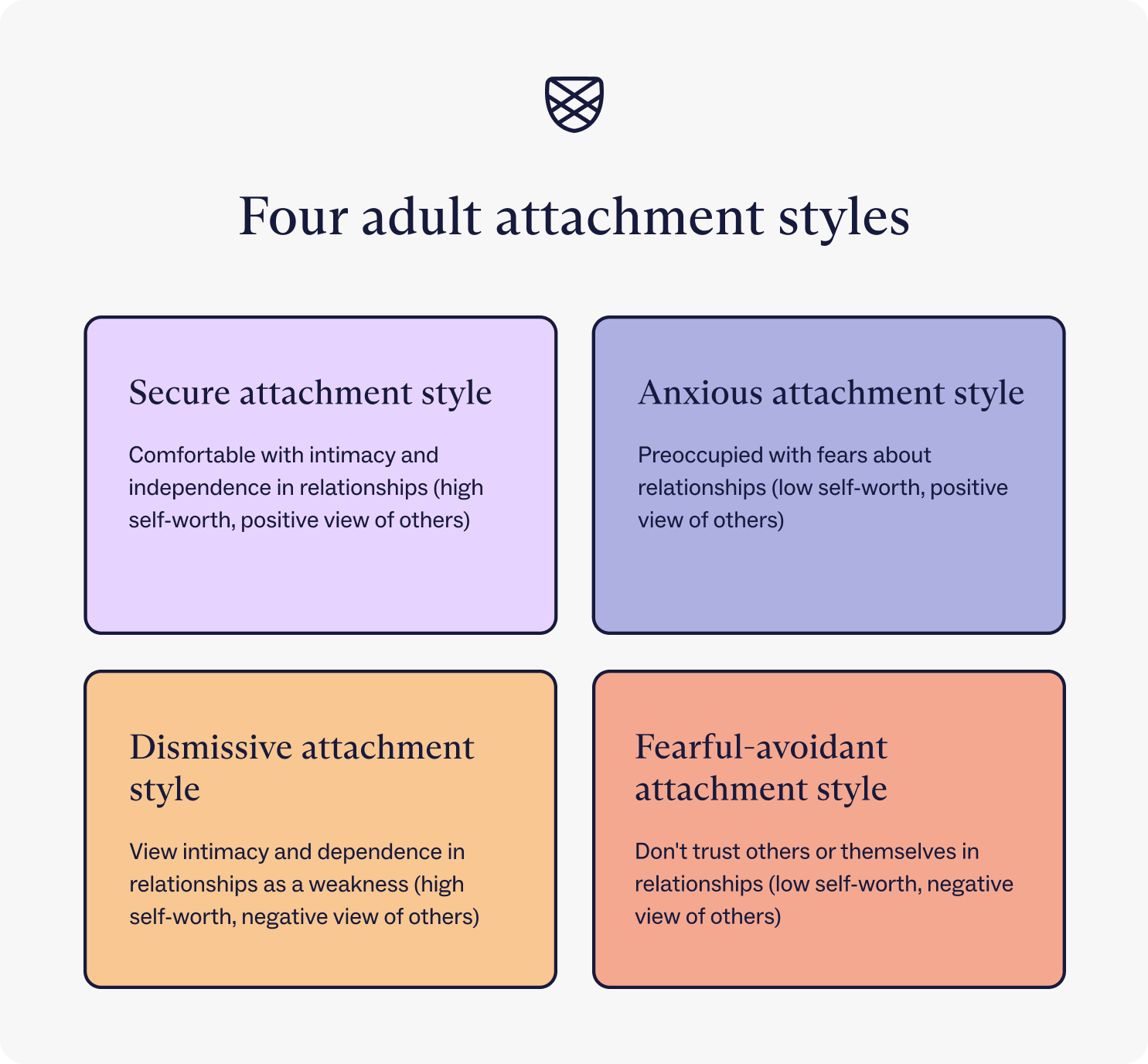
Table of Contents
Do You Have a Secure Attachment Style?

Written By: Dr. Rasna Kaur Neelam

Clinically Reviewed By: Dr. Don Gasparini
January 11, 2023
6 min.
Research suggests that those with a secure attachment style report higher levels of satisfaction in relationships and are more likely to seek out support when needed. Here's what you need to know.
Learn more about our Clinical Review Process
Table of Contents
Shania is a lawyer who just started her first job after law school. She’s been in therapy to address an unhealthy relationship in her past and has learned how to:
- Maintain a healthy sense of self-esteem even when she’s stressed
- Engage in many activities that bring her joy
- Build close friendships
- Feel confident meeting new people
- Set appropriate boundaries
While it is impossible to accurately diagnose or describe an individual with limited information, the above sample character description captures many of the common traits seen in people with a secure attachment style, which we explore below.
What are attachment styles?
Attachment styles are the types of behavior individuals showcase in and around relationships with others. Attachment styles can describe all kinds of relationships – friendships, romantic relationships, relationships between parents and their children, and more.
Knowing your attachment style can help you better understand why you feel certain emotions regarding relationships. These feelings may include fear and disgust, anxiety and vulnerability, security and confidence, or others.
Keep in mind that it is always possible to move from an unhealthy, or insecure, attachment style to a more secure one through the help of therapy or other types of support. Additionally, it is entirely possible to have more than one attachment style throughout your life or even dependent on the type of relationship.
The basis of the four attachment styles rests on how individuals view themselves and how individuals view others.
What does this mean?
Ask yourself the following two questions:
- Do you believe you are worthy of love and support?
- Do you think other people are trustworthy, available, and accepting?
Based on your answers to the two questions above, the table below, describing four attachment styles, can shed light on your own attachment style.
The focus of this blog post is the attachment style in the top left corner (Cell I), titled “Secure.” Individuals who fall into this type of attachment style would generally answer “yes” to the first question above and “yes” to the second.

Secure attachment style
Individuals with a secure attachment style have high opinions of both themselves and others. They have a high sense of worthiness and also expect that others will generally be accepting and responsive. They are comfortable with intimacy and also with self-control, setting boundaries, and participating in both friendships and relationships.
Just like anyone else, individuals with a secure attachment style have periods of self-doubt and anxiety. They may also have problems with friendships, relationships, and partnerships.
However, unlike in the insecure attachment styles, individuals with a secure attachment style can overcome these difficulties by using honest communication, setting boundaries with regard to relationships they cannot control, employing positive coping skills, and retaining a positive sense of self. Overall, these individuals have healthy long-term relationships with themselves and others.
Secure traits
In a research study introducing the four-category model of attachment styles, researchers studied students in an introductory psychology course and asked them to fill out questionnaires. These questionnaires asked questions about demographics, friendships, self-esteem, self-acceptance, sociability, relationships, and interpersonal problems.
From information gathered in the study, we know that individuals with a fearful-avoidant attachment style are more likely to do the following:
Have self-confidence
Individuals with a secure attachment style think they are worthy of love and care.
Have a good balance of control in friendships
People with this attachment take on a healthy balance in relationships where they rely on others and are vulnerable with others. At the same time, the friends feel they can confide in and lean on these individuals.
Have close friendships and romantic relationships
Individuals with a secure attachment style have close friendships and also have romantic relationships at the appropriate age.
Do you need more support with
your mental health?
Charlie Health can help.
I’m a parent. How can I ensure my child develops a secure attachment style?
Charlie Health clinicians explain that the way we learn to attach to others is through the type of care we receive early in childhood. As a result, the following behaviors can help you guide your child toward a secure attachment style. However, because more than just parenting style goes into the development of a child’s attachment style (discussed below), there is never a guarantee regarding the outcome.
Consistent care
The opposite of consistent care, or inconsistent care, refers to parents who do not provide for and are not consistently responsive to their child. Over time, this teaches children to distrust others and rely on themselves. To avoid this, it is important for parents to try their best to be a constant source of care, support, love, and affection for their child.
Be a safe space for your child to explore
Children can learn to explore, navigate, and healthily fail in the world. Doing so while having a safe space at home with a parent or guardian to confide in is a helpful way for children to develop healthy relationships with themselves and others.
Other factors outside of early parent-child experiences help inform our relationships as we enter adolescence and adulthood, explains Pamela Li, Editor-In-Chief of Parenting for the Brain. As you read the following, consider how these may impact your attachment style.
The development of an individual’s social competence
Social competence is a person’s ability to interact successfully with others. This involves reading social cues, responding to those cues, communicating effectively, and resolving conflicts. This is often learned in childhood. Being successful at this skill set can mean you are more likely to have friends and enjoy interacting with others. Social competence is also strongly related to mental health, self-esteem, academic performance, staying out of trouble, and more. Do you consider yourself socially competent? Why or why not?
Relationships with peers
Relationships with friends, romantic partners, teachers, coaches, and friends, not just your parents, all influence the type of person we become. The people we interact with also impact our attachment style. Are your relationships successful? Do you have many or few friendships and relationships? All of these experiences contribute to your view of others and your future relationships.
Genetic influences
While this is an area of ongoing research, we know that certain genetics may predispose us to certain attachment styles.

It is also possible for an individual with all of the positive experiences listed above to not form a secure attachment style. Through therapy, these individuals can work to understand the reasoning behind their fears and anxieties and move to a healthier and more secure attachment style.
Is therapy helpful if I have a secure attachment style?
Therapy can be a helpful tool for anyone wanting to learn more about themselves, want to learn more about their relationships with others, experience short or long-term challenges, and more. This certainly includes those with a secure attachment style.
Some ways in which therapy can help include:
- Learning to set healthy boundaries in relationships
- Understanding why others with a different attachment style may behave differently from you
- Learning self-compassion
- Reframing and reworking negative self-talk
- Working on self-care
- Improving communication
- Understanding your strengths and weaknesses in a more objective way
Family and relationship support at Charlie Health
At Charlie Health, we’re here to help. Our virtual Intensive Outpatient Program (virtual IOP) specializes in helping clients ages 11-30 work through serious mental health conditions like anxiety, depression, trauma, self-harm, behavioral issues, and more. We know that healing starts at the root, and sometimes that means getting to the core of your attachment style. Get started today.





